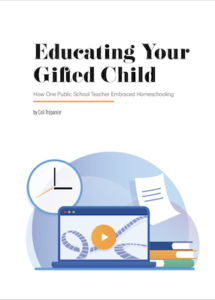Testing Your Gifted Child: Considerations and Options

“David! David! Come here, quick! Jordan just said her first word! Oh my gosh, I can’t believe it! She said ‘Greta,’ She said the dog’s name, ‘Greta!’ David, this can’t be possible. She just turned four-months-old yesterday!”
As Jordan grew, her advanced verbal ability was quite apparent, and family, friends, and even strangers commented on her extensive vocabulary. At nine-months-old, Jordan was correctly stringing together words to make complete, coherent sentences. By the age of one, Jordan was having simple conversations with adults; she was also outgoing and spoke to everyone.
From her first word, Jordan’s parents wondered if she might be gifted, but watching their baby girl chat it up with everyone she met gave them the most joy at that time. Jordan hit developmental milestones far ahead of the expected average age. By the time Jordan turned four-years-old, she was reading first-grade level books on her own which created a few issues in her Pre-K class.
When kindergarten rolled around, Jordan was deep into chapter books and could do single- and double-digit addition and subtraction. Jordan’s parents knew they could no longer ignore their daughter’s precociousness. Still, their school district did not test for giftedness until third grade because the gifted education program did not begin until then. Waiting until third grade or paying for private testing, which can be expensive, was a concern Jordan’s parents discussed often.
Deciding to test or not to test five-year-old Jordan became a huge concern for her parents.
To Test or Not To Test
Testing a child to identify that they are gifted has been an important topic, not without its controversies. Many factors come into play:
• Is there essential behavioral, psychological, or intellectual information needed from the testing for educational or mental health purposes?
• Why is it necessary to test and identify a child as being gifted?
• At what age should a child be tested for giftedness?
• If a child was not selected for gifted testing at public school, is the cost of private testing justified?
Every gifted child is different, and every situation concerning whether or not to test will vary, even among siblings within the same family. Deciding to test or to not test depends on each individual case and its specific considerations.
Why Test?
Testing to identify a child as gifted is most often done for educational considerations, specifically for the purpose of placing a child in a gifted education program or class. For gifted children to reach their full potential, they have unique educational needs that must be addressed in school. Additionally, a gifted assessment can help identify a child’s strengths and weaknesses in different areas of cognitive processing. Finally, many gifted children have coexisting learning conditions (e.g., ADHD, dyslexia, auditory processing disorder)— such children are referred to as twice-exceptional (2E). Cognitive testing can help discover both giftedness and accompanying learning difficulties, if any.
If your school district offers gifted education programming and you suspect your child could be eligible, then testing is warranted. Receiving an appropriate education that meets the educational, social, and emotional needs of gifted children is critical. Taking any steps to ensure a challenging, engaging education for your gifted child is vital.
As mentioned above, cognitive assessment can help identify learning disorders such as ADHD, dyslexia, executive functioning disorder, or auditory processing disorder for which a gifted child will need special accommodations. Unfortunately, these learning conditions can be masked by a gifted child’s strengths, and go unnoticed for a long time, sometimes until the child is in their late teens. Obtaining and understanding the bigger picture of your gifted child’s intellectual strengths, areas of weaknesses, and any learning differences then becomes imperative.
Making the Decision to Test
Once you take into account all the factors that can play into the decision of whether or not to test your child for giftedness, you may still be uncertain. Most public school districts do not test until a student is around eight-years-old and in third grade. What can you do if your child is of the appropriate age for gifted testing and was not selected for testing at their school but you are almost certain that your child is gifted? What if your child was sick during the school’s prescreening process or your child’s teacher did not recommend him for gifted testing? If your child recently transferred from another country, state or province, or school system and missed testing in third grade, then testing may be necessary. Private gifted testing is undoubtedly costly, but luckily, there are some tools that may help you to make a decision.
There are options for evaluating the likelihood your child is gifted before requesting your child’s school to test your child or spending money on a private gifted assessment. There are several free, online behavioral checklists and questionnaires you can use to help you determine if your child may be gifted and needs further testing to confirm their giftedness. The results from these questionnaires and checklists can help you determine whether testing—private or through your child’s school—is needed. See below for the links to a few of these online checklists and questionnaires.
These options are highly recommended in cases where socioeconomic, cultural, or ethnic attributes contribute to gifted children from these groups not being identified. Too often, these children fall through the cracks of our school systems and can lead to underachievement, turning to unacceptable or delinquent behavior, disengagement from school, and even mental health issues. Identifying these gifted children from marginalized groups, who are often passed over for gifted education programs, provides them their right to an appropriately challenging and engaging education.
When to Test
The consensus from gifted professionals is not to test before age six, with the optimal age range of testing being between the ages of six- and eight-years-old.
Who Should Do the Testing?
Testing for giftedness should be done by child psychologists with a licensing specialization in educational psychology. Gifted students are most often tested through their school system, and parents have little control over the factors which can skew test results. When the child was not selected for a gifted assessment or when the test results are not as expected, many parents who can afford to, then turn to private testing by a child psychologist in private practice. If your child was tested through their school system and you feel the test results were inaccurate, try the online checklists and questionnaires to determine if either pushing your child’s school district to retest or to have private testing done is necessary. One should note that retesting for giftedness can only be done after one year from the date of the original testing.
Jordan’s Parents’ Decision
Because of Jordan’s extraordinary precociousness and to help them determine her future educational plans, Jordan’s parents knew a complete evaluation of her intellectual strengths and any areas of weakness would be necessary once Jordan reached six-years-old, the minimum recommended age for testing. Consideration of all the factors and options regarding your child and gifted testing is essential to make the right choice for your gifted child.
Links to Various Online Checklists and Questionnaires
A Gifted Child Checklist for Teachers
An Early Childhood Assessment Tool to Identify Young Gifted Children
General Checklist for Identifying Gifted and Talented Students
 Crushing Tall Poppies
Crushing Tall Poppies



Thinking about your idea of a housing development for gifted families reminded me of a time it seemed to happen naturally. These are some great tales from Laurel Canyon by a master storyteller – https://www.youtube.com/watch?v=Ca4TkEzQxAs. It’s one of the ways I like to hope it could turn out.
Thank you for sharing this link! Yes, it would be nice if there were such places for gifted people!
It’s nice to see such a detailed account online, although it’s a bit discouraging. Personally, we experienced some prejudice because we were in a foreign country. Looking back, we should have used someone in our own country or someone familiar with our family, culture and goals.
I guess not testing before age 6 probably is a good rule. Before formal schooling, it’s hard to know if a child can understand what a tester is even doing. I just wanted to add that I heard about a child who gave wrong answers on purpose, according to his mom; he was very bright and young and thought it was some form of a game. Thanks Celi and everone.
Hi Nicolette,
Your story about the child who gave wrong answers on purpose shows that a test is only as good as the entire testing environment. That’s why it is best to use a combination of tools, such as the questionnaire mentioned and parent surveys, to determine giftedness. Also, you are absolutely right about testing prejudices——it is not uncommon, unfortunately.
Testing, educating, nurturing, and raising gifted children is a bumpy journey which is why gifted children need their parents to be knowledgeable and strong advocates for them. There is so much misinformation and misunderstanding about giftedness.
All the best to you and your family, Nicolette!
Take care. We had our eldest tested at 3 on the recommendation of our pediatrician. My child was…somewhat less than cooperative. Very impatient–especially with mispronunciations by the psychologist and lack of understanding. For example, she was shown a picture of a ball and asked what it was. She said, “sphere.” Tester repeated the question and child snapped out, “I already told you! It’s a sphere!” She was asked what color an orange was, and said, “I don’t know.” On the way home, she asked, “Mommy, what’s a nornch?” I replied that it was an orange and asked what color it was. She looked at me as if I were crazy and said, “Orange, of course!” The psychologist determined that she didn’t know her shapes and colors. And we paid good money for that!
Second child. We were still trying to work with the school. The reading specialist had tested both children and determined that there were no reading skills through high school that either one had not already mastered. Psychologist–who had been recommended by the local GT group–insisted on using the Woodcock-Johnson test, because he had just turned 4, despite his reading proficiency. He asked the question, “If you were on your way to school and you were going to be late, what would you do?” Child was confused and stammered, “Why, nothing.” On the way home I–who had had my ear to the door–asked, “If you were getting ready to go to school and you were going to be late, what would you do?” Again, the what-are-you-nuts? look, and the answer, “I’d hurry up, of course!” Had he been on his way to school, he would have been on a school bus, and there wasn’t a darn thing he could do about it! We paid good money for that assessment also.
We did not test third and fourth children. There was no need. They didn’t go to school. It didn’t matter.
This is not uncommon. Tests are as good as the tester, the testing environment, the emotional and physical condition your child is in that day, and the test used——so many factors play into getting the most accurate test results. And these tests are not always a complete picture of your gifted child. Many use the standard intelligence tests in combination with surveys answered by the parent about their child, a behavioral questionnaire from the child’s teacher, and professional observations to get a more accurate picture.
It’s a difficult process for sure and I’m sorry your testing ordeals were less than a good experience.
Thank you for sharing your warning for parents; it is advice we all need to heed.
I think if the child is correcting the tester, that pretty much tells you everything you need to know. 🙂
One of the other flaws in IQ tests are those that have timed sections. A lot of gifted children will refuse to be rushed on principle and score lower as a result.